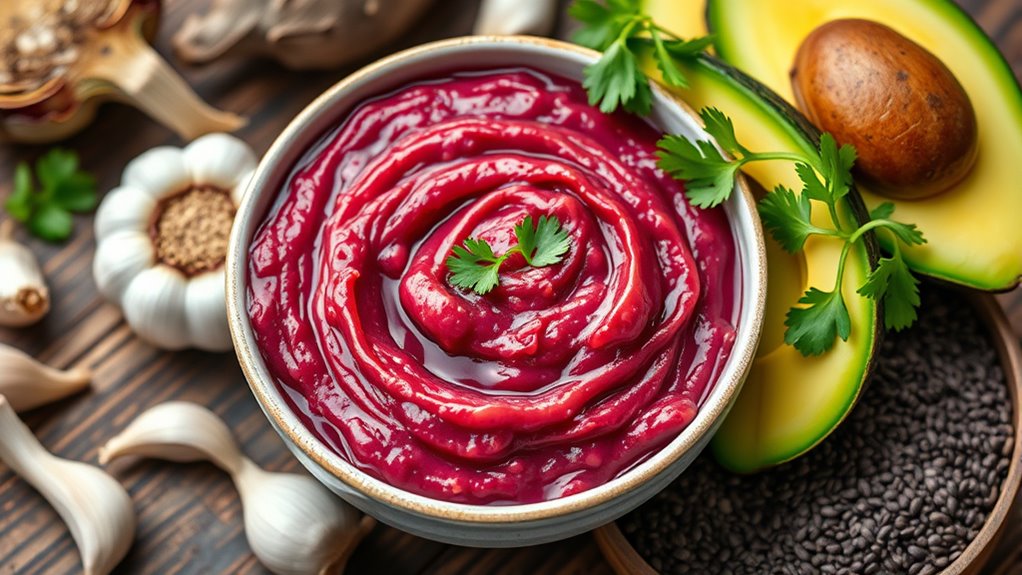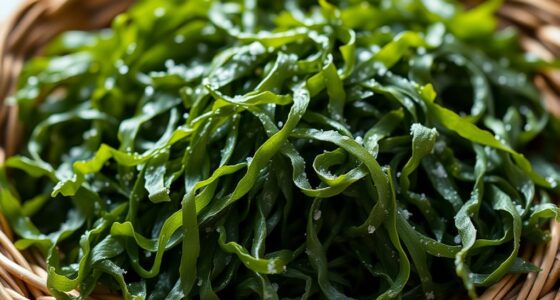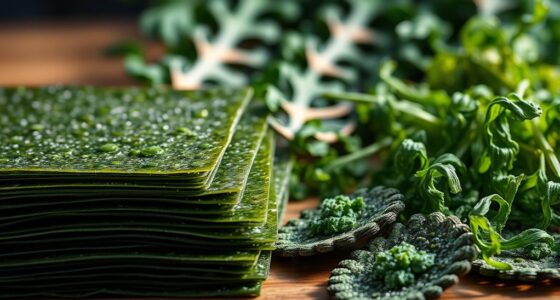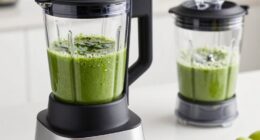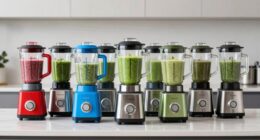To support your gut health on a vegan diet, include both prebiotic-rich foods like garlic, onions, bananas, and whole grains, and fermented foods such as kimchi, sauerkraut, tempeh, or miso, which provide beneficial probiotics. Combining these creates a synergy that promotes a diverse, resilient microbiome, aiding digestion, boosting immunity, and improving overall well-being. If you want to maximize these benefits, explore how to incorporate these foods effectively into your daily meals.
Key Takeaways
- Incorporate fermented plant-based foods like kimchi, sauerkraut, and miso to introduce beneficial probiotics into your vegan diet.
- Consume prebiotic-rich foods such as garlic, onions, bananas, and whole grains to nourish beneficial gut bacteria.
- Pair probiotic foods with prebiotics to enhance bacterial growth and improve gut health.
- Regularly include a diverse range of plant-based fermented and prebiotic foods to foster a resilient gut microbiome.
- Maintaining a balanced intake of prebiotics and probiotics supports digestion, immunity, and overall well-being on a vegan diet.
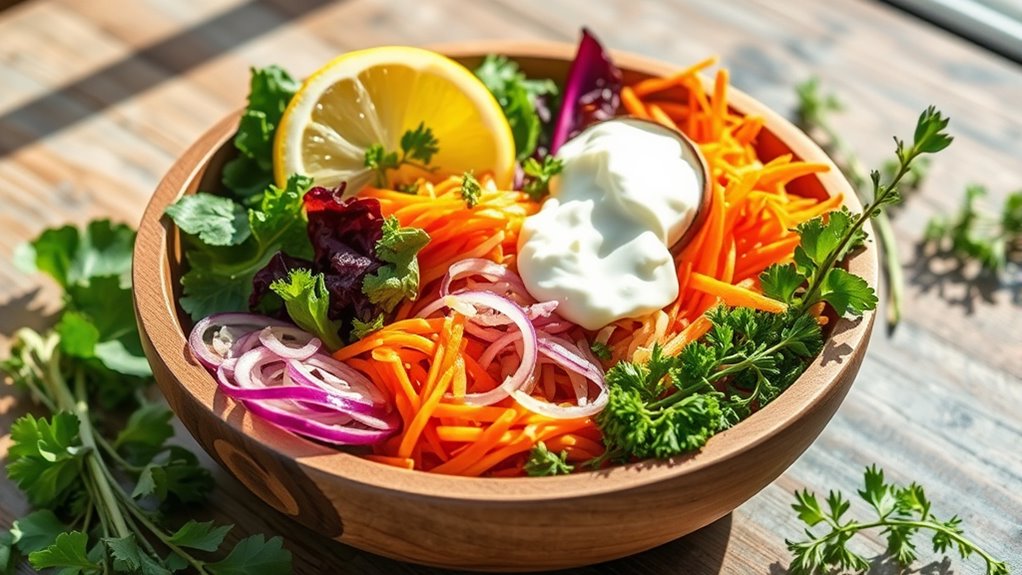
Have you ever wondered how a vegan diet impacts your gut health? One of the key factors is the fermentation benefits that come from consuming plant-based sources. Fermentation is a natural process where microorganisms like bacteria and yeasts break down food, creating beneficial compounds that support your digestive system. When you eat fermented foods, you’re introducing live probiotics into your gut, which can improve digestion, boost immunity, and even influence your mood. These benefits are especially relevant for vegans, as many traditional fermented foods are plant-based, making it easier to incorporate them into your diet. Think of foods like sauerkraut, kimchi, tempeh, and miso—rich in live cultures that help maintain a healthy balance of gut bacteria. By regularly consuming these plant-based sources of fermentation, you provide your gut with the tools it needs to fight off harmful bacteria and promote better nutrient absorption.
Additionally, a vegan diet naturally includes a variety of prebiotics—certain types of fiber that serve as food for your beneficial gut bacteria. Prebiotics are essential because they help foster a diverse and thriving microbiome. Foods such as garlic, onions, leeks, bananas, and whole grains are excellent plant-based sources of prebiotics. When you include these in your meals, you’re not just feeding your gut bacteria but also encouraging the growth of probiotic strains that support digestion and overall gut health. This symbiotic relationship between prebiotics and probiotics is vital for maintaining a resilient and balanced microbiome.
Maintaining gut health on a vegan diet also involves understanding the synergy between prebiotics and probiotics. Consuming fermented foods rich in probiotics alongside prebiotic-rich plant foods amplifies their benefits. For example, pairing kimchi with whole wheat bread or adding garlic to your stir-fry can enhance the proliferation of good bacteria in your gut. This combination helps create an environment where beneficial microbes thrive, leading to improved digestion, reduced inflammation, and enhanced immune function. Since plant-based sources of both prebiotics and probiotics are abundant and diverse, you have a wide range of options to support your gut health without relying on animal products.
Frequently Asked Questions
Can Vegans Get Enough Probiotics Without Supplements?
Yes, you can get enough probiotics without supplements by including fermented vegetables like sauerkraut and kimchi in your diet. Dairy alternatives such as plant-based yogurts also offer beneficial probiotics. Eating a variety of these foods regularly helps maintain healthy gut bacteria. Just make certain you choose unpasteurized options, as pasteurization can kill beneficial microbes. Incorporate these into your meals daily for ideal gut health on a vegan diet.
Are Plant-Based Prebiotics Sufficient for Gut Health?
Yes, plant-based prebiotics are generally sufficient for gut health if you focus on fiber diversity. They promote fermentation benefits, encouraging good bacteria growth in your gut. Eating a variety of fiber-rich foods like fruits, vegetables, legumes, and whole grains provides the diverse prebiotics needed for ideal gut function. This diversity helps maintain a balanced microbiome, supporting digestion, immunity, and overall health without relying solely on supplements.
How Do Cooking Methods Affect Probiotic Content?
Cooking methods can considerably impact probiotic content, especially through fermentation techniques and cooking temperature. Fermentation boosts probiotics, but exposing fermented foods to high temperatures can kill beneficial bacteria. When you cook at high temperatures, like boiling or frying, you reduce probiotic levels. To preserve probiotics, use gentle cooking methods or add fermented foods after cooking. Keep in mind, lower cooking temperatures help maintain the probiotic benefits in your vegan meals.
Can Vegan Diets Cause Probiotic Deficiencies?
Is your gut missing a symphony of beneficial bugs? Vegan diets can cause probiotic deficiencies if you don’t include animal-based probiotics or dairy-free fermentation sources. While plant foods offer prebiotics, they may lack enough live probiotics. To maintain balance, incorporate fermented plant-based products like sauerkraut, kimchi, or vegan probiotic supplements—your gut will thank you for this probiotic harmony.
Which Vegan Foods Support Long-Term Gut Health?
You can support long-term gut health by including fermented vegetables like sauerkraut and kimchi in your diet, as they provide beneficial probiotics. Additionally, incorporate vegan fiber sources such as beans, lentils, oats, and chia seeds to nourish your good bacteria. These foods help maintain a healthy gut environment, improve digestion, and boost your immune system over time. Regularly including them guarantees sustained gut health on a vegan diet.
Conclusion
As you nurture your gut with plant-based prebiotics and probiotics, you might notice your digestion becoming more harmonious, like a gentle breeze stirring through a lush garden. It’s no coincidence that as you embrace vegan foods, your gut flora thrives, creating a vibrant ecosystem inside you. With each mindful choice, you’re cultivating harmony beneath the surface, turning your body into a thriving, colorful jungle—proof that caring for your gut is truly a natural, beautiful coincidence.
Ilana has been a vegan for over 10 years. She originally made the switch for health reasons, but soon found herself becoming more and more passionate about the ethical and environmental implications of a vegan lifestyle. Ilana is the author of The Graceful Kitchen, a blog all about veganism. She loves to cook up delicious and nutritious vegan meals, and share her recipes with others who are interested in leading a cruelty-free life. Ilana is also a strong advocate for using whole foods as the foundation of a healthy diet, and believes that going vegan is one of the best ways to achieve this.
